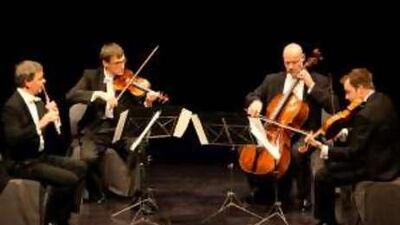One can go one of two ways on Mozart. The most popular tendency, of course, is to rejoice in his cherubic high spirits, relish his sticky-fingered antics and generally rain kisses on his tousled head. The alternative, less discussed but no less viable, is to emit a silent scream of exasperation whenever he crops up. Kingsley Amis put this latter position well in Lucky Jim when he made Dixon snarl at "some skein of untiring facetiousness by filthy Mozart"; these were words to punch the air at if you happened to be wired the right way. And a small number of music lovers genuinely are. Indeed, I'm one of them.
In light of this fact, the Dejean Quartet, brought from Germany by the Dubai Concert Committee, were rather unlucky to get me as their reviewer on Sunday. So wrapped up in Mozartiana are they that they even take their name from one of the poor saps who fell foul of his legendary unreliability. Ferdinand De Jean was a Dutch surgeon and amateur flautist who offered Mozart a large sum to write a series of pieces for him to play. Mozart did about half of them and then lost interest in the project; when pressed to explain, he said that he just didn't much like writing for the flute.
Dejean, being a flute quartet, appear to have adopted this anecdote rather in the spirit of the green girdle, an ever-present reminder of their own mortal fallibility. They don't stop at the name, either; they play Mozart in every performance - partly, it would appear, out of a sort of masochistic ancestor worship, though one also suspects that, being a flute quartet, they aren't exactly spoilt for material.
In charm, however, they are rich. They look like a University Challenge team got up in white tie and tails; an incongruous sight in the Mall of the Emirates (though the Ductac theatre is pretty incongruous itself, a working replica of a provincial English repertory house transplanted into a shopping centre the size of Liechtenstein). They offer bashful and courteous explanations of their programme - introducing Ferdinand Ries's Quartet in D Minor, the cellist Cornelius Schmaderer stammers, "It's a very nice piece. The melodies are very pleasant to listen to".
Their sound is burnished, strident, just the right side of lovely. The three string players go at their instruments with satisfying attack, chords buzzing like blasts from an accordion; no excess syrup, in other words. Their flautist also has an attractive touch: a subtle vibrato and husky low notes. All of these traits were most agreeably displayed in the sawing, spiralling allegro to the Ries quartet, but the ensemble was well balanced and synchronised throughout the evening.
Their bill, on the other hand, was all over the place. Of the constitutionally required Mozart, the best was his Quartet in D Major; the adagio strikes an atypically doleful note, floating a lugubrious flute melody on a soft pizzicato accompaniment. The Johann Christian Bach Quartet in C Major inevitably looked a bit dull in comparison, its mechanical rotation of blithe major key themes and admonitory minor reversals suggesting an interminable string of comic misadventures; if ever Bouvard and Pecuchet gets the film adaptation it deserves, this would make an excellent piece to play over the opening credits.
Then there was the Ries. Best known as a memoirist of his teacher Beethoven, Ries straddled the Classical-Romantic divide in his own work; think tangling ornaments plus key changes that drop you through a trapdoor. He made for an agreeably louring presence on a programme that generally erred on the side of sunny neatness, and the players brought out his strenuousness well. My own favourites, though these pieces were received rather coolly by the rest of the audience, were a pair of Aaron Copland threnodies. In the first, written to memorialise Igor Stravinsky, a slow, pensive accretion of string harmonies drifts ever further from resolution as the flute skirls in some wild atonic interval-cycle miles above. An atmosphere of soft foreboding and regret swells into something approaching hysteria in the second piece, as the strings and flute trade voluptuous chords and needling little shrieks.
These were the odd men on the programme, undoubtedly; the anguished effusions of a 20th century American set against 18th century German confections. But if they did nothing else, they served to illustrate the flute quartet's under-explored range. Perhaps Mozart was hasty in writing it off so soon.
elake@thenational.ae

